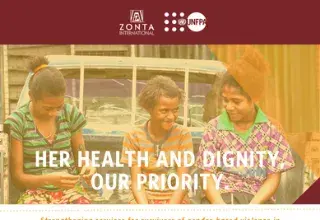BJORN ANDERSSON, UNFPA ASIA-PACIFIC REGIONAL DIRECTOR: STATEMENT FROM THE FLOOR
8TH ASIA PACIFIC FORUM ON SUSTAINABLE DEVELOPMENT, BANGKOK, MARCH 22-26, 2021
Thank you, Honourable Chair; Distinguished Delegates; Ladies and Gentlemen.
On behalf of UNFPA, allow me to congratulate UNESCAP for organising the 8th APFSD with its urgent and timely theme of Sustainable and resilient recovery from the COVID-19 pandemic in Asia and the Pacific.
We are more than a year into a crisis that has engulfed every corner of the globe, including Asia-Pacific. As we seek to build back better, we must take stock of what we have lost over the past year, including progress made under the Sustainable Development Agenda – and we must strategise on how best to regain, and surpass, our earlier momentum in this Decade of Action towards the 2030 finish line.
Before the pandemic, Asia and the Pacific had already witnessed substantial socio-economic transformation - including significant improvements in access to sexual and reproductive health services that have strengthened the rights and choices of women in particular.
Unfortunately, the gains have been uneven.
Approximately one quarter of people in Asia-Pacific live in poverty, with large pockets of deprivation in both developing and developed economies.
There is an ever-growing divide between those who have access to opportunities and those who do not.
And this includes far too many women, girls, young persons and the elderly who remain vulnerable to disparities and shocks – such as the COVID-19 pandemic.
The Asia-Pacific region has seen an encouraging reduction in maternal deaths through increased access to midwifery and skilled birth attendance. However, we need to do more. Every hour 10 women in the region die as a result of complications in pregnancy and childbirth – that’s 10 women too many.
More women than ever before have access to contraceptives in Asia-Pacific. But there remain over 80 million women with unmet need for family planning, resulting in unintended pregnancies and unsafe abortion.
There is far greater awareness of gender-based violence, with strengthened legal frameworks across much of the region aimed at tackling a long-hidden scourge. Despite this, violence remains pervasive – as do harmful practices such as child marriage, female genital mutilation and gender-biased sex selection.
We’ve been witnessing rapid population ageing in Asia-Pacific. Although women are outliving men, they are far more likely than men to experience wrenching poverty in old age, without adequate safety nets in a majority of countries.
And not least, Asia-Pacific, the world’s most disaster prone region, is experiencing an increasing number of complex, multi-hazard disasters and climate-related events. This threatens development gains and widens inequalities, with the severest impact on those most left behind.
The COVID-19 pandemic has exacerbated all of these challenges, as UNFPA had warned at the outset of the crisis little more than a year ago.
Contraceptive supply chains have been disrupted. Essential reproductive health services have been diverted. Gender-based violence has escalated amid lockdowns and other movement restrictions. Older persons been not only been more susceptible to COVID-19 infection, the pandemic has pushed more of them into poverty. Natural disasters on top of COVID-19 have overwhelmed many countries, impacting women and girls on multiple fronts.
Even before the pandemic, persistent negative social norms and gender inequality hindered universal access to sexual and reproductive health and reproductive rights – access envisioned under the landmark Programme of Action stemming from the 1994 International Conference on Population and Development, or ICPD.
As the custodian of the Programme of Action, UNFPA has underscored its centrality to sustainable development, as have Member States in Asia and the Pacific. UNFPA is committed to supporting governments’ efforts to achieve the ICPD Programme of Action, in line with national development priorities.
We are collaborating with governments, communities, civil society and the UN to bring about the societal change necessary - to dismantle historical and structural inequalities that undermine the achievement of gender equality and women’s empowerment, so that the lives of women and girls are valued equally with the lives of men and boys.
We advocate for a life-cycle approach, where increasing investment in sexual, reproductive, maternal, neonatal and child health can strengthen the ability of young persons to achieve their full potential, improve long-term lifestyles and promote healthy ageing.
UNFPA is also working with regional and country level partners to strengthen capacities to address the needs of women and girls during emergencies. Through a Regional Pre-positioning Initiative, UNFPA is ensuring that supplies are available quickly for lifesaving sexual and reproductive health and gender-based violence response services. The pandemic has shown all the more that fast access to critical supplies saves lives.
Our collective action under the ICPD Programme of Action and its centrality to the Sustainable Development Agenda is now more crucial than ever at this juncture in the COVID-19 narrative.
Let us urgently work together to strategise on solutions that respond better to the complexity of the evolving challenges of today and those that may come tomorrow. The health, wellbeing and prosperity of millions of people depend on this.




